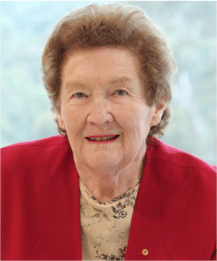Vale Professor Ruth Frances Bishop AC 1933–2022
Celeste M. Donato , Graeme Barnes and Julie E. Bines #Microbiology Australia 43(3) 144-144 https://doi.org/10.1071/MA22046
Submitted: 5 August 2022 Accepted: 5 August 2022 Published: 25 August 2022
© 2022 The Author(s) (or their employer(s)). Published by CSIRO Publishing on behalf of the ASM. This is an open access article distributed under the Creative Commons Attribution-NonCommercial-NoDerivatives 4.0 International License (CC BY-NC-ND)

|
Professor Ruth Bishop is known nationally and globally as one of the co-discovers of rotavirus – an immeasurable contribution to global child health and microbiology.
Ruth graduated with a Bachelor of Science (1954), followed by a Master of Science (1958), PhD (1961), and a Doctor of Science (1978); all from the University of Melbourne. She was also awarded a prestigious Honorary Fellowship from the Royal Australasian College of Physicians (2008) and an Honorary Doctorate of Medical Science (2010) from the University of Melbourne. Ruth had a longstanding involvement with the Australian Society for Microbiology, becoming a member in 1978, a Fellow (1989), and was awarded an Honorary Life Membership (2008).
In the early 1970s, Dr Rudge Townley, Director of Gastroenterology at the Royal Children’s Hospital (RCH), persuaded Ruth to focus on acute diarrhoea. At the time paediatric gastroenteritis was a significant cause of mortality globally and the aetiological agent was often unknown. For 2 years Ruth meticulously analysed intestinal specimens taken from infants with gastroenteritis at the RCH. No conclusive bacterial cause could be determined but severe damage was found in the duodenum. Ruth began to suspect a virus may be involved and in 1973 intestinal biopsies were sent to the University of Melbourne to be examined by electron microscopy. Virus particles were observed in the first sample examined.
The discovery of rotavirus by Ruth and her colleagues Geoffrey Davidson, Ian Holmes, and Brian Ruck changed global child health. Rotavirus was ultimately found to be the leading cause of acute gastroenteritis in children worldwide, with almost every child experiencing an infection in the first years of life. In children aged <5 years, rotavirus caused 114 million episodes of diarrhoea annually worldwide, resulting in an estimated 453 000 deaths. There are several licensed rotavirus vaccines that are included in national immunisation programs in over 112 countries worldwide and the burden of rotavirus disease has greatly diminished. However, challenges remain in providing vaccines to the most vulnerable children in low- and middle-income countries. Ruth also made a substantial contribution in addressing these challenges when her studies revealed newborns in Melbourne obstetric hospitals were asymptomatically excreting a unique rotavirus strain. The RV3 vaccine program emerged from follow-up studies that revealed these children were protected against subsequent community outbreaks of rotavirus. Decades of work by Ruth and a global team of colleagues has led to successful clinical trials of the RV3-BB vaccine in New Zealand, Indonesia, and Malawi.
Ruth had extensive involvement with the WHO, including roles as Chair of the Steering Committee on Viral Diarrhoeal Diseases, Director of the WHO Regional Collaborating Rotavirus Laboratory and Special Adviser to the WHO Vaccine Development Program. As leader of a dynamic research team at the Murdoch Children’s Research Institute (MCRI) for many years, Ruth set an enduring tone of global collaboration and a supportive environment.
Following her retirement in 2009, Ruth continued to play an active role in rotavirus research at MCRI, joining the weekly lab meetings until her health declined in 2015. She was immensely proud of all the students she supervised and mentored over her career, many of whom have gone on to become leaders in their respective fields. Her passion for the education of women and advocacy for women in STEMM was enduring and she actively encouraged many of her female staff to pursue higher education in the form of MD and PhD degrees.
An extensive array of national and international honours were bestowed on Ruth during her career, including the University of Melbourne Selwyn-Smith Prize for Clinical Research (1978), the Clunies Ross National Science and Technology Award (1998) and the Children’s Vaccine Initiative Award (WHO Geneva 1998). Ruth was awarded the Prince Mahidol Award in the Field of Public Health presented by the Thai Royal Family (2011) and became the first woman to be awarded the Florey Medal (2013). In 1996, she was made an Officer of the Order of Australia and in 2019 was promoted to the highest national honour, Companion of the Order of Australia (AC), in recognition of her service to global child health and to medical research. Of particular note, Bill and Melinda Gates cited Ruth as a major influence in their establishment of their global health foundation.
Ruth leaves behind an incredible legacy, not only for her scientific discoveries and achievements, but in the numerous scientists and clinicians around the world whom she taught, mentored, and inspired.
# This tribute was written on behalf of former friends, staff and colleagues who generously shared many wonderful memories of their time with Ruth.


